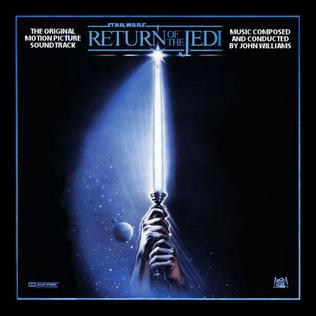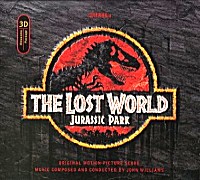
Jerrald King Goldsmith was an American composer and conductor known for his work in film and television scoring. He composed scores for five films in the Star Trek franchise and three in the Rambo franchise, as well as for Logan's Run, Planet of the Apes, Tora! Tora! Tora!, Patton, Chinatown, Alien, Poltergeist, Gremlins, Hoosiers, Total Recall, Air Force One, L.A. Confidential, Mulan, and The Mummy. He also composed the fanfares accompanying the production logos used by multiple major film studios, and music for the Disney attraction Soarin'.

Jurassic Park III is a 2001 American science fiction action film directed by Joe Johnston and written by Peter Buchman, Alexander Payne and Jim Taylor. It is the third installment in the Jurassic Park franchise, and the final film in the original Jurassic Park trilogy, following The Lost World: Jurassic Park (1997). It is also the first film in the franchise not to be directed by Steven Spielberg, as well as the first not to be based on a novel by Michael Crichton; however, the film features characters and ideas by Crichton, including scenes from his first novel Jurassic Park (1990). Sam Neill and Laura Dern reprise their roles from the first film. New cast members include William H. Macy, Téa Leoni, Alessandro Nivola, Trevor Morgan and Michael Jeter. The film is about a divorced couple who deceive paleontologist Dr. Alan Grant (Neill) into helping them find their son (Morgan), who is missing on Isla Sorna.

The Lost World: Jurassic Park is a 1997 American science fiction action film. It is the second installment in the Jurassic Park franchise and the second film in the original Jurassic Park trilogy. A sequel to 1993's Jurassic Park and loosely based on Michael Crichton's 1995 novel The Lost World, the film was directed by Steven Spielberg from a screenplay by David Koepp. Jeff Goldblum, Richard Attenborough, Joseph Mazzello and Ariana Richards reprise their roles from the original film with Julianne Moore, Pete Postlethwaite and Arliss Howard joining the cast.

Numerous video games based on the Jurassic Park franchise have been released. Developers Ocean Software, BlueSky Software and Sega produced various games in 1993, coinciding with the first film, Jurassic Park. In 1997, several developers, including DreamWorks Interactive and Appaloosa Interactive, produced various games for nine different platforms to coincide with the release of the film The Lost World: Jurassic Park.

The Lost World: Jurassic Park is an action-adventure video game developed by DreamWorks Interactive and Appaloosa Interactive, and published by Electronic Arts and Sega for the Sony PlayStation and Sega Saturn, respectively, in 1997. The Lost World: Jurassic Park is based on the film of the same name, which in turn is based on the novel by Michael Crichton. In 1998, a special edition of the game was released for the Sony PlayStation as a Greatest Hits title and featured several modifications to the gameplay.
The various film and theatre appearances of the Superman character have been accompanied by musical scores.

Star Wars Episode III: Revenge of the Sith – Original Motion Picture Soundtrack is the film score to the 2005 film of the same name released by Sony Classical on May 3, 2005, more than two weeks before the film's release. The music was composed and conducted by John Williams, and performed by the London Symphony Orchestra and London Voices in February 2005, with orchestrations provided by Conrad Pope and Eddie Karam. The score was Williams' sixth score in the saga. Shawn Murphy recorded the score. Ramiro Belgardt and Kenneth Wannberg served as music editors; Wannberg served as music editor for the previous Star Wars scores. A remastered version of the soundtrack was released by Walt Disney Records on May 4, 2018.

Star Wars: Return of the Jedi is the film score to the 1983 film Return of the Jedi, composed and conducted by John Williams and performed by the London Symphony Orchestra. The score was recorded at the Abbey Road Studios in January and February 1983. Again, John Williams served as producer. Herbert W. Spencer, Thomas Newman and Gordon Langford served as orchestrators. Engineer Eric Tomlinson, music editor Kenneth Wannberg, and record supervisor Lionel Newman again reprised their respective duties. The score earned another Academy Award nomination for Williams. Return of the Jedi, which is the original trilogy's shortest score, was only released on a single-LP instead of a double-set like the Star Wars and The Empire Strikes Back soundtracks before it.

Jurassic Park: Original Motion Picture Soundtrack is the film score to the 1993 Steven Spielberg film of the same name, composed and conducted by John Williams. Alexander Courage and John Neufeld served as orchestrators.

The Lost World: Jurassic Park is the title of several different video games released for handheld video game consoles in 1997. Four versions, each with their own gameplay variations, were developed and published by various companies for the Sega Game Gear, Nintendo's Game Boy, and Tiger Electronics' game.com and R-Zone consoles. Each version is based on the 1997 film of the same name.

Jurassic Park, later also referred to as Jurassic World, is an American science fiction media franchise created by Michael Crichton and centered on a disastrous attempt to create a theme park of cloned dinosaurs. It began in 1990 when Universal Pictures and Amblin Entertainment bought the rights to Crichton's novel Jurassic Park before it was published. The book was successful, as was Steven Spielberg's 1993 film adaptation. The film received a theatrical 3D re-release in 2013, and was selected in 2018 for preservation in the United States National Film Registry by the Library of Congress as being "culturally, historically, or aesthetically significant". A 1995 sequel novel, The Lost World, was followed by a film adaptation in 1997. Subsequent films in the series, including Jurassic Park III (2001), are not based on the novels.

Jurassic Park III: Original Motion Picture Soundtrack is a score of the 2001 film of the same name. It was orchestrated, composed and conducted by Don Davis and performed by the Hollywood Studio Symphony. Davis incorporated John Williams' themes from the previous films into the score.

The Lost World is a 1995 science fiction action novel written by Michael Crichton, and the sequel to his 1990 novel Jurassic Park. It is his tenth novel under his own name and his twentieth overall, and it was published by Knopf. A paperback edition (ISBN 0-345-40288-X) followed in 1996. In 1997, both novels were re-published as a single book titled Michael Crichton's Jurassic World, which is unrelated to the 2015 film of the same name.

E.T. the Extra-Terrestrial: Music from the Original Soundtrack is the score to the 1982 film of the same name composed and conducted by John Williams. The album was first released by MCA Records on June 11, 1982. It won the Academy Award for Best Original Score and Grammy Award for Best Score Soundtrack for Visual Media. The album was reissued in expanded form in 1996, and again in a slightly more expanded edition in 2002, before being remastered and reissued in a limited-edition two-disc set by La-La Land Records on September 26, 2017.

Jurassic World: Original Motion Picture Soundtrack is the film score to Jurassic World composed by Michael Giacchino. The album was released digitally and physically on June 9, 2015 by Back Lot Music.

Jurassic World: Fallen Kingdom is a 2018 science fiction action film directed by J. A. Bayona and written by Derek Connolly and Colin Trevorrow. The sequel to Jurassic World (2015), it is the second installment in the Jurassic World trilogy and the fifth installment overall in the Jurassic Park film series. Chris Pratt, Bryce Dallas Howard, BD Wong, and Jeff Goldblum reprise their roles from previous films in the series, with Toby Jones, Ted Levine, and Rafe Spall joining the cast. The story follows Owen Grady and Claire Dearing as they return to the fictional Central American island of Isla Nublar to rescue the remaining dinosaurs from an impending volcanic eruption, only to discover a mercenary team's ulterior motives to bring them to the US mainland.

Jurassic World: Fallen Kingdom is the film score for the 2018 film of the same name composed by Michael Giacchino. The album was released by Back Lot Music on June 15, 2018 digitally and physically.

Jurassic World Dominion (Original Motion Picture Soundtrack) is the film score album to the 2022 film of the same name composed by Michael Giacchino. The sixth film in the Jurassic Park franchise, it is also the sequel to Jurassic World: Fallen Kingdom (2018) and the final film in the Jurassic World trilogy, while also serving as a conclusion to the storyline started in the original Jurassic Park trilogy. It is directed by Colin Trevorrow, who co-wrote the script with Emily Carmichael and story with Derek Connolly, and produced by Frank Marshall and Patrick Crowley, who also produced the predecessors, with Steven Spielberg, who directed Jurassic Park (1993), served as the executive producer.

Dr. Henry Wu is a fictional character in the Jurassic Park franchise. He is introduced in Michael Crichton's 1990 novel Jurassic Park, which began the franchise. He also appears briefly in the novel's 1993 film adaptation, and plays a larger role in the Jurassic World film trilogy. Dr. Wu is the lead geneticist for the dinosaur theme parks Jurassic Park and Jurassic World, overseeing the de-extinction of dinosaurs through genetic engineering. He is killed by a Velociraptor in the novel, but survives throughout the film series, in which he is portrayed by actor BD Wong. Although Wu is a supporting character in the novel, he has a drastically reduced role in the film adaptation, directed by Steven Spielberg. Wong and Wu are both Asian-American, and the actor believed that the role was reduced, to his disappointment, because of "racial exclusion in Hollywood".

















